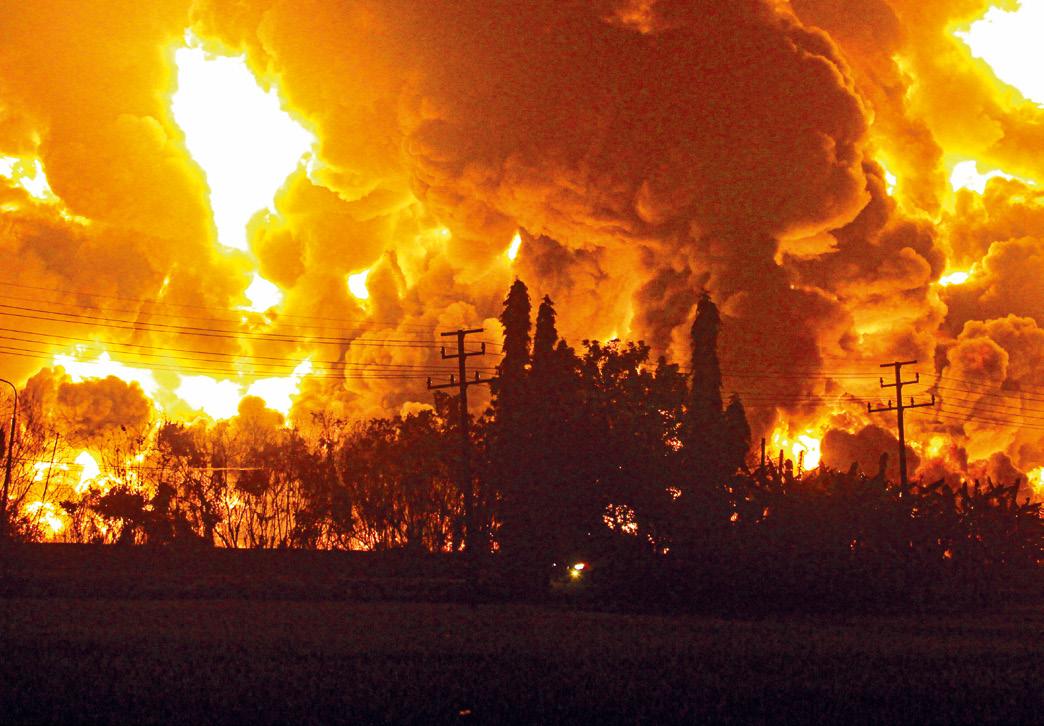
4 minute read
THE FOSSIL FUEL INDUSTRY IS EXPANDING PLASTIC PRODUCTION, THREATENING CLIMATE AND HUMAN HEALTH
The cross-sector promotion of recycling (and “advanced recycling”) is enabling fossil fuel and petrochemical companies to appear committed to addressing the plastic pollution crisis while continuing to invest massively in new infrastructure to extract oil and gas to make virgin plastic.187 The fact that fossil fuel companies are investing hugely both in new fossil exploration and production188 and in new ethane crackers189 and associated virgin plastic production strongly suggests that they do not envisage a wholesale shift to recycled plastic. Indeed, a study from the Minderoo Foundation found that none of the world’s largest 100 polymer producers procures more than 2% of its feedstock from recycled or bio-based materials.190
If business as usual continues, industry estimates predict that plastic production could double by 20302035 and triple by 2050, in comparison to 2015.191 One conservative estimate predicts that by 2050 the sector will have used up between 10% and 13% of the world’s 1.5 °C carbon budget (the remaining allowance of carbon emissions that must not be exceeded if we are to stay within the 1.5°C carbon budget).192
Advertisement
ENVIRONMENTAL JUSTICE IMPACTS
The expansion of plastic production, if allowed to continue, won’t only impact our climate and environment. The toxic and carcinogenic pollutants that fossil fuel extraction and plastic production emit193 alongside GHGs will continue to threaten the health of more communities close to the new facilities (in the U.S. a burden disproportionately borne by low-income communities and communities of color).194
Fossil fuel extraction sites,195 refineries196 and petrochemical plants197 all emit a range of toxic and carcinogenic chemicals into the air, putting nearby communities as well as local ecosystems at risk. In the case of fracking, surface and groundwater pollution can also be significant.198 A recent compendium of scientific studies “uncovered no evidence that fracking can be practiced in a manner that does not threaten human health.”199
As of 2010 in the U.S., 17.6 million people (6% of the population) lived within a mile of an active oil or gas extraction site.200 According to the recent report Fossil Fuel Racism by Greenpeace USA, the Gulf Coast Center for Law & Policy and the Movement for Black Lives,201 56% of the “toxic burden” of U.S. refineries is borne by people of color (who make up 39% of the country’s population) and 19% by low-income people (who make up 14% of the population). The petrochemical sector’s impact on people of color is even worse: they bear 66% of the toxic burden, while 18% falls on low-income people. For both refineries and petrochemical facilities, a majority of toxic burden falls in areas that have both above-average populations of color and below-average income.202
Turning to end-of-life impacts, toxic emissions from incineration of plastic and other waste materials (including so-called “waste-to-energy”) also threaten the health of nearby residents.203 In the U.S., approximately
80% of waste incinerators are located in low-income
communities, communities of color, or both.204 Incinerators being built in the UK are following the same pattern: they are three times more likely to be built in the poorest communities than in the wealthiest ones. Moreover, existing UK incinerators tend to be located in areas with above-average populations of people of color.205 Landfills often present similar environmental injustices.206
The plastic waste trade also particularly impacts communities in the Global South – where historically much of Europe and North America’s plastic waste has been exported, supposedly for recycling. China used to take the bulk of this waste, but since it banned plastic imports in 2018, plastic waste streams have been redirected, first toward Southeast Asian and African countries207 and more recently to Turkey as well.208
A series of investigations has revealed exported waste from countries in the Global North being illegally dumped and polluting local environments. For instance, Greenpeace investigators from Italy, UK, and Malaysia found household plastic from countries including the UK,209 Italy210 and Germany211 at multiple illegal dump sites in Malaysia, while a BBC investigation found British plastic waste being burned near communities in Turkey.212 A 2019 Frontline/NPR investigation found plastic waste exported from the U.S., supposedly for recycling, being dumped in Indonesian communities.213 Greek and Liberian authorities remain at loggerheads about an illicit shipment of plastic waste from Greece to the West African nation in late 2019.214
Such disputes can drag on for years. Between 2013 and 2014, 103 shipping containers of mixed municipal waste from Canada, including unrecyclable plastics, were illegally dumped215 in the Philippines. Although 69 containers were eventually repatriated in 2019 after numerous campaigns for their return, the contents of 26 containers were dumped in open landfills and eight remain unaccounted for to this day.216
29 March 2021, Balongan Oil Refinery, West Java, Indonesia. The fire broke out at the Balongan refinery, run by state oil firm Pertamina in Indramayu. Five people were seriously injured and 1,000 were evacuated. © Panji Purnomo / Greenpeace
18 April 2012. Bradford County, Pennsylvania, USA. "Waste water associated with shale gas extraction can contain high levels of total dissolved solids, fracturing fluid additives, metals, and naturally occurring radioactive materials" EPA © Les Stone / Greenpeace











